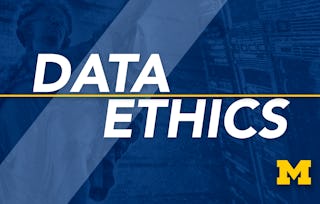Computing applications involving large amounts of data – the domain of data science – impact the lives of most people in the U.S. and the world. These impacts include recommendations made to us by internet-based systems, information that is available about us online, techniques that are used for security and surveillance, data that is used in health care, and many more. In many cases, they are affected by techniques in artificial intelligence and machine learning.

Ethical Issues in Data Science

Ethical Issues in Data Science
This course is part of Vital Skills for Data Science Specialization

Instructor: Bobby Schnabel
4,246 already enrolled
Included with
49 reviews
Recommended experience
What you'll learn
Learners will be able to Identify and manage ethical situations that may arise in their careers.
Learnerrs will be able to apply ethical frameworks to help them analyze ethical challenges.
Learners will be familiar with key applications of data science that are commonly linked to ethical issues.
Skills you'll gain
Details to know

Add to your LinkedIn profile
4 assignments
See how employees at top companies are mastering in-demand skills

Build your subject-matter expertise
- Learn new concepts from industry experts
- Gain a foundational understanding of a subject or tool
- Develop job-relevant skills with hands-on projects
- Earn a shareable career certificate

There are 5 modules in this course
This module begins with an introduction to the course including motivation for the topic, the course goals, what topics the course will cover, and what is expected of the students. It then reviews the three ethical frameworks that are most commonly applied to ethical discussions in data science and computing: Kantianism/deontology, virtue ethics, and utilitarianism. Case studies are used to illustrate the application and properties of these frameworks.
What's included
5 videos6 readings1 assignment3 discussion prompts
This module begins with some background about the Internet, which is the foundation for most of the topics that we study in this course. It then discusses the two most basic ethical issues in using the internet, privacy and security, in the context of data science. It goes through a number of real case studies and examples for each to illustrate the diversity of issues.
What's included
5 videos2 readings1 assignment1 peer review2 discussion prompts
This module provides insight into the ethical issues in the data science profession and workplace (as opposed to technical topics in data science). It starts with discussion of two highly relevant codes of professional ethics, from professional societies in statistics and in computing. It then looks at a variety of recent workplace ethics issues in tech companies. A key part of this module is interviewing a data science professional about ethical issues they have encountered in their career.
What's included
4 videos2 readings1 assignment1 peer review1 discussion prompt
Algorithmic bias may be the topic that people associate most with ethical issues in data science. This module begins by providing some general background on algorithmic bias and considering varying views on the pros and cons of algorithmic vs. human decision making. It then reviews an illustrative set of examples of algorithmic bias related to gender and race, which is a particularly important class of instances of algorithmic bias. The final part of the module discusses what is perhaps the single most prominent and discussed instance of algorithmic decision making and bias, facial recognition.
What's included
6 videos3 readings1 assignment1 peer review1 discussion prompt
Data science is applied to a wide variety of important application areas, each with their own ethical issues. This module focuses on an application area that is both particularly important and leads to a rich set of ethical issues: medical applications. This includes looking at current issues involved with health databases and the uses of artificial intelligence in healthcare, and more futuristic issues, gene editing and neurological interventions. The module concludes with a crucial topic that every data science profession should consider: the implications of the fields of data science and computing on the future of human work.
What's included
6 videos3 readings1 peer review3 discussion prompts
Earn a career certificate
Add this credential to your LinkedIn profile, resume, or CV. Share it on social media and in your performance review.
Build toward a degree
This course is part of the following degree program(s) offered by University of Colorado Boulder. If you are admitted and enroll, your completed coursework may count toward your degree learning and your progress can transfer with you.¹
Instructor

Offered by
Explore more from Data Analysis
 Status: Preview
Status: PreviewUniversity of Michigan
 Status: Free Trial
Status: Free TrialUniversity of Colorado Boulder
 Status: Free Trial
Status: Free TrialUniversity of Colorado Boulder
 Status: Preview
Status: PreviewUniversity of Leeds
Why people choose Coursera for their career

Felipe M.

Jennifer J.

Larry W.

Chaitanya A.
Learner reviews
- 5 stars
87.75%
- 4 stars
6.12%
- 3 stars
2.04%
- 2 stars
2.04%
- 1 star
2.04%
Showing 3 of 49
Reviewed on Jun 12, 2021
I learned a lot about ethical issues and computer Science. Good lectures, good reading material, but a whole lot of writing
Reviewed on Nov 15, 2021
A course full of valuable information and beautiful skills
Reviewed on Dec 6, 2024
Very good course. I learned a lot from this course.

Open new doors with Coursera Plus
Unlimited access to 10,000+ world-class courses, hands-on projects, and job-ready certificate programs - all included in your subscription
Advance your career with an online degree
Earn a degree from world-class universities - 100% online
Join over 3,400 global companies that choose Coursera for Business
Upskill your employees to excel in the digital economy
Frequently asked questions
To access the course materials, assignments and to earn a Certificate, you will need to purchase the Certificate experience when you enroll in a course. You can try a Free Trial instead, or apply for Financial Aid. The course may offer 'Full Course, No Certificate' instead. This option lets you see all course materials, submit required assessments, and get a final grade. This also means that you will not be able to purchase a Certificate experience.
When you enroll in the course, you get access to all of the courses in the Specialization, and you earn a certificate when you complete the work. Your electronic Certificate will be added to your Accomplishments page - from there, you can print your Certificate or add it to your LinkedIn profile.
Yes. In select learning programs, you can apply for financial aid or a scholarship if you can’t afford the enrollment fee. If fin aid or scholarship is available for your learning program selection, you’ll find a link to apply on the description page.
More questions
Financial aid available,

